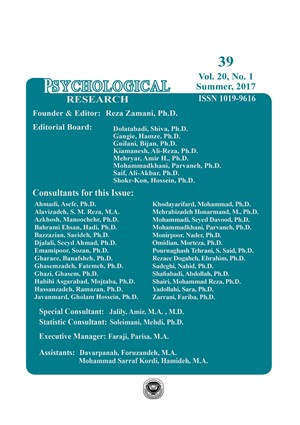-
-
List of Articles
-
Open Access Article
1 - Effectiveness of Anger Management Training based on Cognitive-Behavioral Approach on Parents' Aggression and Mental Health
mohsen Shokoohi-Yekta -
Open Access Article
2 - Predicting Academic Performance in English Language Based on the Components of English Language Classroom Anxiety
Ramazan Hassanzadeh -
Open Access Article
3 - Comparative Effectiveness of Meta-Cognitive Therapy (MCT) and Cognitive Behavioral Therapy (CBT) on Decreasing Anxiety and Worry of individuals with Generalized Anxiety Disorder
mina Mojtabaei -
Open Access Article
4 - Comparison of Criminal Thinking Styles of Substance-Dependent and Independent Offenders
malek Mirhashemi -
Open Access Article
5 - Relationship between Spiritual Intelligence and Internal Locus of Control with Students’ Mental Health
mahnaz Mehrabizadeh Honarmand -
Open Access Article
6 - Explanation of Wisdom on the basis of Spiritual Intelligence and Religious Orientation
rasool Kord Noghabi
-
The rights to this website are owned by the Raimag Press Management System.
Copyright © 2017-2026







